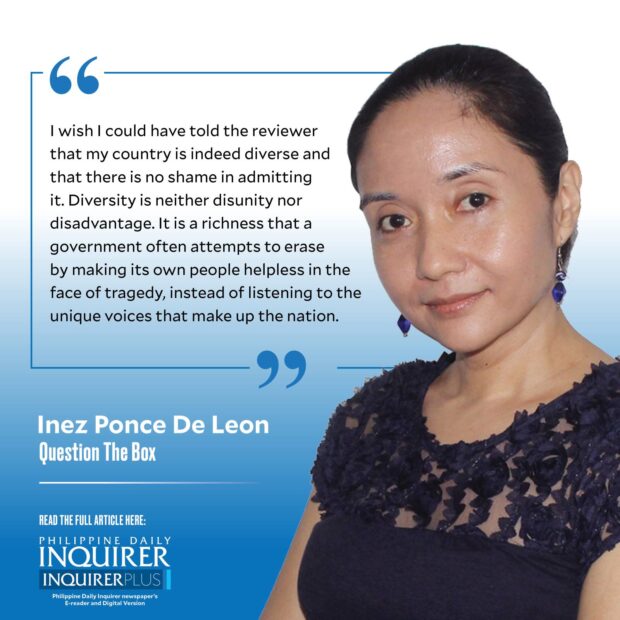Defying the discourse of boundaries and chains
 Research is the top priority for university professors: we need to gather and analyze data, write a manuscript, and submit it to a journal. The journal editor has the option of rejecting it outright or sending it to a panel of reviewers for peer review. The peer review process can take months, and there’s no assurance that one’s paper can be published, not until the reviewers give their full approval.
Research is the top priority for university professors: we need to gather and analyze data, write a manuscript, and submit it to a journal. The journal editor has the option of rejecting it outright or sending it to a panel of reviewers for peer review. The peer review process can take months, and there’s no assurance that one’s paper can be published, not until the reviewers give their full approval.
I was once part of a project that studied communities affected by Supertyphoon “Yolanda.” Instead of asking why people didn’t obey warnings, we asked how they understood the warnings and what they had learned. We traveled to Guiuan, Palo, Coron, Camotes, and Roxas, conducted focus group discussions and interviews, and built a story of how people understood storms and storm warnings.
There, indeed, was a unique story for each province. I had to create five different papers, one for each location. I wouldn’t have done justice to the data otherwise.
One day, I sent off my third paper for peer review. I later received a letter from the editor: a reviewer had accused me of plagiarism. More precisely, a reviewer (who had read my first two papers) claimed that I had simply gone to different places in the same country using the same technique to gather data, so my findings would be the same regardless of location.
I was so horrified, that I immediately typed out a response: We are a country of over a hundred living languages and cultures spread across thousands of islands. Read the manuscript first and compare it to my previous work.
The editor cleared me and sent my letter to the reviewers. A few months (and one round of revisions) later, the journal published my paper.
Looking back, I realize that I wasn’t so much offended at being accused of plagiarism. I was dismayed by the insinuation that we, as a country, are all the same people, that no research would be legitimate if it were to illustrate the unique contexts in which we all live.
I wish I could have told the reviewer about the Guiuan group that said they wished they had heard “tsunami” because the last storm surge they saw on TV was too weak, or the Coron group who said that they had always known about storm surges so please for the love of God do not call it “daluyong” because no one knows what that is, or the Palo group who didn’t care about warnings and just needed the promise of relief goods.
I wish I could have told the reviewer that my country is indeed diverse and that there is no shame in admitting it. Diversity is neither disunity nor disadvantage. It is a richness that a government often attempts to erase by making its own people helpless in the face of tragedy, instead of listening to the unique voices that make up the nation.
And it happens again and again—especially now, when everyone is expected to simply obey and “respect” authority.
It reflects centuries of colonization, where those with power drew boundaries with rulers rather than through intimate knowledge of the cultures and peoples they had invaded.
Boundaries are no mere lines. Boundaries split up the vast lands of what is now called the Middle East, breaking up tribes and enclosing warring clans into one territory. Boundaries allowed a suffering people to take control of a state, create an open-air prison, and foist their own suffering on another group that would be bombed and starved for decades. Boundaries allowed terrorist groups to grow and use centuries of resentment to indoctrinate the dispossessed into lives of violence.
Boundaries gave birth to the wars and conflict we know today, all because a colonizer deemed their outsider perspective as both objective and superior, all as those in power became blind to the pain they inflicted.
The colonizer’s discourse of standardization and supposed objectivity permeates today’s research arena as well. We of the Global South are ignored when we tell our stories, and yet we are also mocked for not having enough publications. Allow a Global North academic to tell our story, however, and that academic is lauded for being daring, insightful, an explorer.
Today, all my articles have been published for each of the provinces I visited, each of them telling a different story. I have sometimes faced incredulity, and even from fellow Filipinos, who insist that telling a story of diversity is akin to dividing an already broken people. Their definition of unity has neither empirical nor rational basis.
It is as if they, too, espouse the colonizer’s discourse of standardization; oversimplified experiences; dictators that silence those whose land they take forcibly, but growl in anger and exact bloody revenge when those same oppressed peoples fight back.
We are not a mere archipelago to be imprisoned behind dashed lines and then invaded by foreigners blind to our richness. We are not a single people simply scattered across different islands with no real culture or will.
We are Filipinos. We are not uncivilized or idiots or animals.
No human being is.
iponcedeleon@ateneo.edu




















